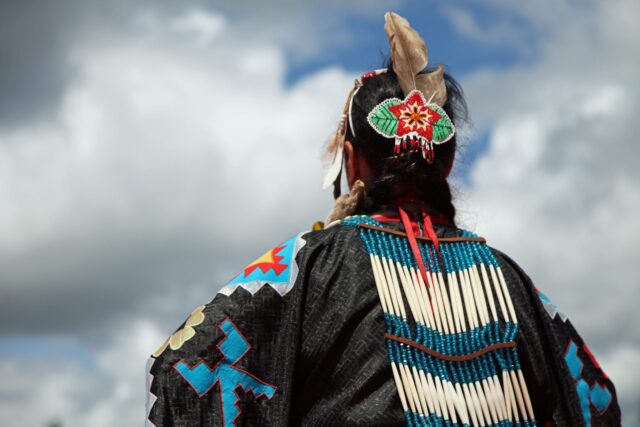WASHINGTON — Since President Donald Trump began his second term in office, the relationship between the nation’s tribes has frayed, largely because $24 billion earmarked for Indian Country, including nearly $700 million to Minnesota tribes, has been threatened.
The federal government has a special relationship with the nation’s Indian tribes and has treaty obligations to provide certain funding.
But problems with this relationship began with a sweeping announcement by the Office of Management and Budget soon after Trump was sworn in in January that halted federal grants nationwide, throwing tribal programs into turmoil.
Although the grant freeze was temporarily halted, some of the money meant for the nation’s tribes has yet to be released, and the Trump administration continues to push to cut off the grants, especially those that implement what the administration has determined are DEI-related or focused on climate change.
“The crux of this whole thing is that the Trump administration is insisting that the (grant cuts) are based on race or climate priorities, but this funding is not based on the priorities of the Trump administration. They are because of treaty obligations,” said Robert Maxim, a Brookings Institution fellow who co-authored a recent report on the funding crisis and is a member of the Massachusetts’ Mashpee Wampanoag nation.
Maxim’s report said a recent analysis of grant cancellations from the Department of Government Efficiency (DOGE) determined that nearly a third of all cancelled grant programs contain the word “tribal,” making it the single most-commonly flagged keyword in the database.
The nation’s tribes, and organizations that help tribal members, receive federal funds from nearly every agency. In Minnesota, the largest grants are awarded for Indian Health Care, tribal self-government, education and child care and broadband expansion. But there are also dozens of smaller grants that fund programs on and off the reservation.
For example, the Minneapolis American Indian Center said $4 million of an Environmental Protection grant that would have helped with the center’s renovation was rescinded.
In total, there is nearly $697 million in outstanding payments to Minnesota tribes.
There are stories about other tribal-run programs that have been cut back or temporarily halted. But Minnesota’s tribes have said little about Trump’s efforts to cut off federal money.
“Prairie Island will continue monitoring the president’s budget changes for any negative impacts to the Tribe, but we have nothing to report at this time,” said Eric Pehle, a spokesman for the Prairie Island Indian Community.
!function(){“use strict”;window.addEventListener(“message”,function(a){if(void 0!==a.data[“datawrapper-height”]){var e=document.querySelectorAll(“iframe”);for(var t in a.data[“datawrapper-height”])for(var r,i=0;r=e[i];i++)if(r.contentWindow===a.source){var d=a.data[“datawrapper-height”][t]+”px”;r.style.height=d}}})}();
In fact, none of the state’s 11 tribes that were contacted responded to requests for information on the impact of the disruption of federal money on tribal operations.
“A lot of individual tribes are reluctant to talk about this,” Maxim said. “They are wary of getting on the bad side of the Trump administration.”
Instead of being “confrontational,” Maxim said many tribes are in a “wait and see” mode.
An unexpected freeze
Minnesota joined 22 other states, led by New York, in suing Trump to release the unexpected freezing of federal funding in January.
The Trump administration rescinded the order and a court also temporarily blocked the unexpected and wide-ranging freeze to federal funding by OMB. But, in the coming months, a federal appeals court will hear arguments for the case that will decide whether the executive branch has legal authority to unilaterally suspend federal grants.
Tribes, however, have a different standing from other American communities that may be impacted by the termination of federal grants.
Tribes have a government-to-government relationship with the United States, “which maintains trust and treaty obligations that require it to meet the economic and social needs of Tribes and Native American people,” the Brookings report said.
“As such, when the federal government withholds funding from Tribes and Native American people, it’s not just a policy change. It’s a violation of those commitments — putting essential services at risk and undermining Tribal governing capacity,” the report continued.
!function(){“use strict”;window.addEventListener(“message”,function(a){if(void 0!==a.data[“datawrapper-height”]){var e=document.querySelectorAll(“iframe”);for(var t in a.data[“datawrapper-height”])for(var r,i=0;r=e[i];i++)if(r.contentWindow===a.source){var d=a.data[“datawrapper-height”][t]+”px”;r.style.height=d}}})}();
According to the Mille Lacs Indian Museum, from 1785 to 1867 the United States signed more than 40 treaties with the Ojibwe people.
In exchange for land and mineral rights, the museum said that tribes retained hunting, fishing, and harvesting rights on the land that they had ceded. The treaties also included annuity payments, debt payments, and payments to individuals of the tribes from the federal government.
“There are certain obligations that the federal government owes tribes in perpetuity,” said Shannon Geshick, executive director of the Minnesota Indian Affairs Council, a state agency that serves as a liaison between the state and Minnesota’s tribes.
Maxim of Brookings said the tribe’s treaty rights is something that “is inconsistently understood by the Trump administration.”
The 1975 Indian Self-Determination and Education Assistance Act increased federal funding to tribes by allowing tribes to contract with the federal government to administer programs previously managed by the Bureau of Indian Affairs (BIA) and other agencies.
Besides eliminating tribal grants, Trump’s One Big Beautiful Bill Act cuts to Medicaid, food stamps and other social welfare programs are likely to impact tribal members. And Trump also wants to make other reductions in federal spending, including cutting federal operational funds for tribal colleges by about 90%, from $182 million to just over $22 million.
While some tribes are adopting a “wait and see” attitude when it comes to attempts to claw back federal funding, others are taking a more proactive stance.
For instance, in June several tribes joined a group of nonprofits and local governments in suing the Trump administration over its termination of federal environmental justice and climate justice grants that were established under former President Biden’s Inflation Reduction Act.
The post Report: Minnesota tribes waiting on nearly $700 million in federal funding appeared first on MinnPost.















































